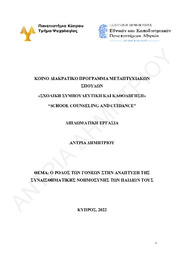| dc.contributor.advisor | Τσώλη, Κωνσταντίνα | el |
| dc.contributor.author | Δημητρίου, Άντρια | el |
| dc.creator | Δημητρίου, Άντρια | el |
| dc.date.accessioned | 2022-05-25T04:40:51Z | |
| dc.date.available | 2022-05-25T04:40:51Z | |
| dc.date.issued | 2022-05 | |
| dc.identifier.uri | http://gnosis.library.ucy.ac.cy/handle/7/65217 | en |
| dc.description.abstract | Η Συναισθηματική Νοημοσύνη είναι μία πολύπλοκη έννοια που ελκύει έντονα το ενδιαφέρον των μελετητών της, λόγω των πρακτικών εφαρμογών και αποτελεσμάτων της που προσφέρει σε ένα ευρύ κοινό. Ιδιαίτερα στο πλαίσιο της οικογένειας, οι συναισθηματικά νοήμονες γονείς, εξαιτίας του ρόλου τους ως προτύπου, επηρεάζουν τη συναισθηματική ανάπτυξη των παιδιών τους. Οι γονείς «συναισθηματικοί μέντορες» στοχεύουν στην εφαρμογή της συναισθηματικής αγωγής, δίνουν αξία σε όλα τα συναισθήματα που βιώνουν τα παιδιά τους, χρησιμοποιούν την έκφραση των συναισθημάτων για να υπάρξει ένα δέσιμο με τα παιδιά τους, προσδιορίζουν τα συναισθήματά τους και τα ενισχύουν με συμβουλευτική παρέμβαση. Καθώς ο γονέας λειτουργεί ως πρότυπο ρόλου, ο προσδιορισμός των συναισθηματικών και κοινωνικών χαρακτηριστικών που αξιολογούνται ως θετικά, επιδρά σημαντικά στην ποιότητα της ζωής των παιδιών.
Στο πλαίσιο της παρούσας μελέτης σκοπός είναι η αξιολόγηση του βαθμού επίδρασης των γονέων ως προς την ανάπτυξη της Συναισθηματικής Νοημοσύνης των παιδιών
τους. Τα ευρήματα της έρευνας προσφέρουν ενδιαφέρουσες πληροφορίες ως προς τους χειρισμούς, την αντίληψη και τις δεξιότητες των γονέων όσον αφορά τη Συναισθηματική Νοημοσύνη. Η έρευνα διενεργήθηκε με τη μέθοδο της ημιδομημένης συνέντευξης κατά το έτος 2022 όπου συμμετείχαν δεκαπέντε (15) γονείς.
Σύμφωνα με τις απόψεις των γονέων, προκύπτουν δυσκολίες σχετικά με την αντιμετώπιση διαφόρων συμπεριφορών των παιδιών αλλά ταυτόχρονα εφαρμόζονται και τεχνικές θετικές ως προς τους τρόπους αντιμετώπισης στα ζητήματα που τους βοηθούν να ανταπεξέλθουν στο ρόλο του γονέα. Τα αποτελέσματα της έρευνας κρίνεται σημαντικό να αξιοποιηθούν σε σχετικά εκπαιδευτικά προγράμματα φοιτητών και φοιτητριών, καθώς και να αποτελέσουν βάση για περαιτέρω έρευνα στο πεδίο της Συναισθηματικής Νοημοσύνης υπό το πλαίσιο της οικογένειας και συγκεκριμένα των γονέων. | el |
| dc.description.abstract | Emotional Intelligence is a complex concept which strongly attracts the interest of its scholars, due to the practical implementations and effects it has to offer to a wide
audience. Particularly within the family framework, emotionally intelligent parents affect their children’s emotional development, due to their role as role models. Parents
who act as ‘emotional mentors’, aim at the implementation of emotional education, give value to all the emotions their children experience, use the expression of emotions as a way of bonding with their children, identify their emotions and support them through consultative intervention. While parents act as role models, the identification of their positive emotional and social characteristics, has a great impact on the children’s quality of life.
As part of this study, the purpose is to assess the extent to which parents impact the development of their children’s Emotional Intelligence. The findings of this study
provide interesting information on parents’ Emotional Intelligence handling, perception and skills. The study was carried out using a semi-structured interview in 2022, with
the participation of fifteen (15) parents. According to the parents’ opinions, difficulties arise in dealing with different behaviors of children, but at the same time, there is the
implementation of techniques that are positive in terms of ways of dealing with issues that help them cope with parenting. It is important that the findings of this study are
used in relevant educational student curricula and that they serve as the basis for further research in the field of Emotional Intelligence in the framework of family and
particularly parents. | en |
| dc.description.sponsorship | Εθνικό και Καποδιστριακό Πανεπιστήμιο Αθηνών (ΕΚΠΑ) | el |
| dc.language.iso | gre | en |
| dc.publisher | Πανεπιστήμιο Κύπρου, Σχολή Κοινωνικών Επιστημών και Επιστημών Αγωγής / University of Cyprus, Faculty of Social Sciences and Education | |
| dc.rights | info:eu-repo/semantics/openAccess | en |
| dc.rights | Open Access | en |
| dc.title | Ο ρόλος των γονέων στην ανάπτυξη της συναισθηματικής νοημοσύνης των παιδιών τους | el |
| dc.type | info:eu-repo/semantics/masterThesis | en |
| dc.contributor.committeemember | Σταυρινίδης, Παναγιώτης | el |
| dc.contributor.committeemember | Μπαμπάλης, Θωμάς | el |
| dc.contributor.department | Τμήμα Ψυχολογίας / Department of Psychology | |
| dc.subject.uncontrolledterm | ΣΥΝΑΣΘΗΜΑΤΙΚΗ ΝΟΗΜΟΣΥΝΗ | el |
| dc.subject.uncontrolledterm | ΓΟΝΕΙΣ | el |
| dc.subject.uncontrolledterm | ΕΝΣΥΝΑΙΣΘΗΣΗ | el |
| dc.subject.uncontrolledterm | ΣΥΝΑΙΣΘΗΜΑΤΙΚΗ ΑΓΩΓΗ | el |
| dc.subject.uncontrolledterm | ΣΥΝΑΙΣΘΗΜΑΤΙΚΕΣ ΚΑΙ ΚΟΙΝΩΝΙΚΕΣ ΔΕΞΙΟΤΗΤΕΣ | el |
| dc.subject.uncontrolledterm | EMOTIONAL INTELLIGENCE | en |
| dc.subject.uncontrolledterm | PARENTS | en |
| dc.subject.uncontrolledterm | EMPATHY | en |
| dc.subject.uncontrolledterm | EMOTIONAL EDUCATION | en |
| dc.subject.uncontrolledterm | SOCIAL AND EMOTIONAL SKILLS | en |
| dc.author.faculty | Σχολή Κοινωνικών Επιστημών και Επιστημών Αγωγής / Faculty of Social Sciences and Education | |
| dc.author.department | Τμήμα Ψυχολογίας / Department of Psychology | |
| dc.type.uhtype | Master Thesis | en |
| dc.contributor.orcid | Τσώλη, Κωνσταντίνα [0000-0001-6414-3172] | |
| dc.contributor.orcid | Μπαμπάλης, Θωμάς [0009-0002-1798-7123 | |
| dc.gnosis.orcid | 0000-0001-6414-3172 | |
| dc.gnosis.orcid | 0009-0002-1798-7123 | |

